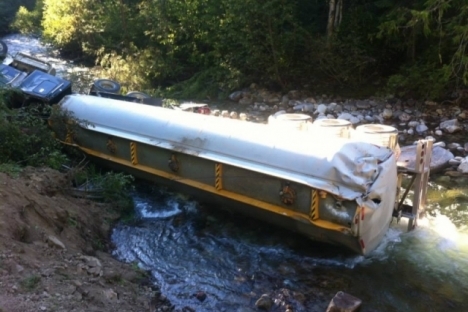Lemon Creek fuel spill trial delayed
The trial on charges stemming from an aviation fuel spill in the Slocan Valley in 2013 is promising to be a long and complicated one.
The trial resumed in Nelson on Tuesday- only to be put off for at least two more months.
Crown counsel John Cliffe told Judge Phillip Seagram the Crown intends to call about 65 witnesses to establish their case.
It’s going to take time to get the material associated with all those witnesses out to defence attorneys.
Seagram agreed to put off the trial until at least December 6, with a short check in November to bring all parties up to date on the preparations.
The Executive Flight Centre, one of its employees, and the provincial government are all co-defendants in the case, begun after a tanker truck carrying aviation fuel up a logging road in the Slocan Valley tipped over and spilled 33,000 litres of fuel into Lemon Creek in July 2013.
The spill killed fish and wildlife downstream, and affected shallow wells of residents living in the area. Residents were also forced to evacuate their homes while the cleanup took place.
It took nearly three years for charges to be laid, and only came after a local activist, Marilyn Burgoon, successfully laid private criminal charges against the defendants. Her win in court prompted the federal government to lay charges in July.
Burgoon said she was happy to hear the Crown is preparing to present so many witnesses for the prosecution.
“I’m glad they’re doing a good job on the investigation and prosecution,” she told reporters after Tuesday’s hearing. “It’s something I never could have done, it would have been too costly and lengthy- and I can’t access what the government can access in terms of information.”
The defendants have been charged with two counts of “depositing a deleterious substance in a water frequented by fish” under the Fisheries Act. The penalty on conviction is a minimum of $5,000 for an individual and $100,000 for the government or a company.
There are also six counts of “introducing waste into a stream causing pollution” under the Environmental Management Act. The maximum penalty set out in the Act is a $1-million fine or six months in jail.
The defendants have not made their pleas in the case.






















